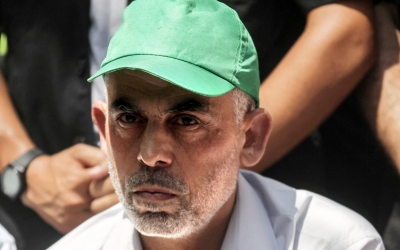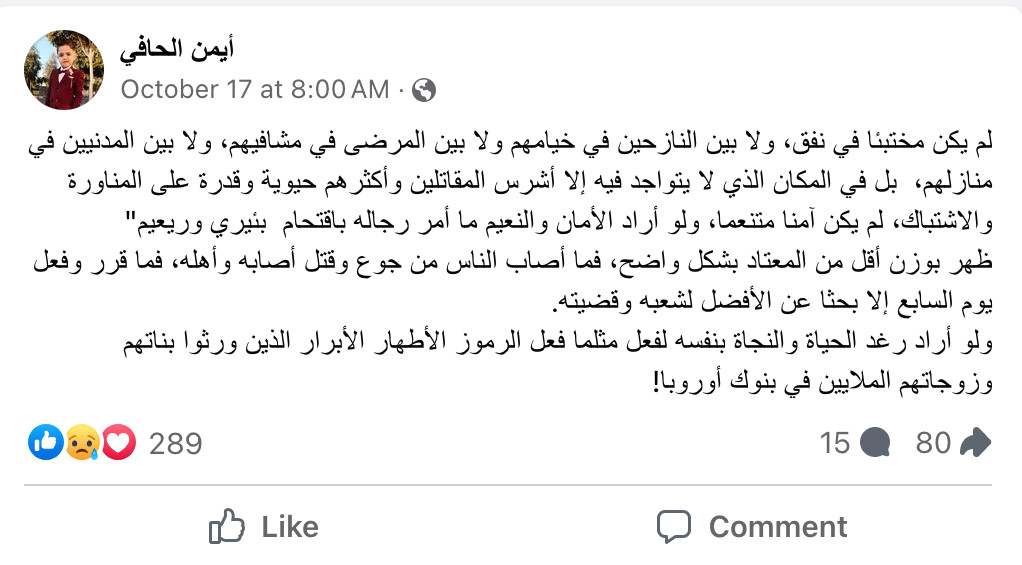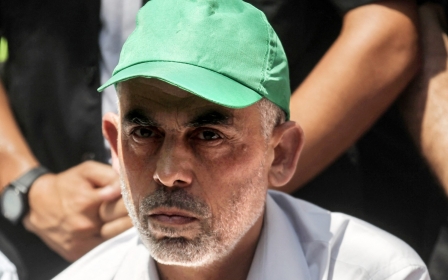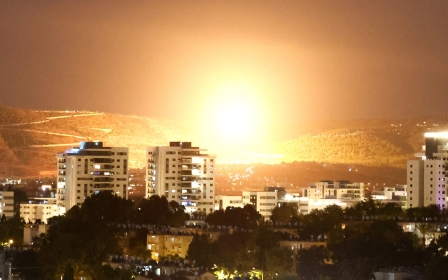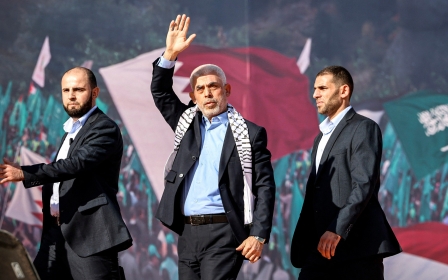'Greetings to the free people of the world': Yahya Sinwar in his own words

This past week, millions around the world watched drone footage of Yahya Sinwar's final moments as he defiantly fought against Israel until he was killed in Rafah on 16 October.
The late Hamas leader in Gaza, who spent 22 years in an Israeli prison from 1989 until his release in 2011 as part of a prisoner exchange, has been vilified by Israeli, American and western mainstream media.
US Vice President Kamala Harris even praised the Israeli military's killing of Sinwar, who was 61. Hamas is proscribed as a terrorist group in the US, UK and the EU.
New MEE newsletter: Jerusalem Dispatch
Sign up to get the latest insights and analysis on Israel-Palestine, alongside Turkey Unpacked and other MEE newsletters
The western depiction of resistance leaders as "terrorists" is not new but a repugnant legacy of colonial times. In Palestine, early British colonialists, their Zionist surrogates and the ensuing Israeli state described every Palestinian nationalist leader as a terrorist.
But for Palestinians, such labels of "terrorism" are simply worthless. To them, Sinwar belongs to a long list of Palestinian resistance heroes who lived and died fighting against British and, later, Israeli colonialism and occupation, seeking liberation and self-determination.
Political mind
To counter what Palestinians view as an honourable martyrdom - dying while fighting on the battlefield - several dubious accounts quickly emerged attempting to dishonour Sinwar and his life.
Indeed, this treatment of Palestinian leaders is typical of western outlets, which often recycle Israeli narratives about Palestinian leaders.
In an upcoming update of my book, Hamas: A Beginner's Guide, I include various quotes from Sinwar, translated from Arabic speeches into English, that reveal a stark contrast between the man himself and the portrayal pushed by Israeli and western media.
Sinwar's speeches reveal a stark contrast between the man himself and the portrayal pushed by Israeli and western media
One key moment that largely escaped the attention of even those who closely study Hamas was a press conference Sinwar held on 26 May 2021, a few days after the 11-day "Sword of Jerusalem" confrontation with Israel that erupted on 10 May.
In an hour and 43 minutes, Sinwar responded to all sorts of questions, allowing for an in-depth journey into his political and military mind.
He spoke about the priority of peaceful and popular resistance over military action, lamented the betrayal of Palestinians by American and western governments, and explored the potential for a long-term truce with Israel and comprehensive peace in the region.
Sinwar also reiterated his warning that Gaza was a pressure cooker on the verge of exploding if conditions remained unchanged. In retrospect, an analysis of his remarks in that press conference would have led to one conclusion: the Gaza impasse is going to implode, with Hamas at its heart.
To mark his death, I translated some of the statements he made during that press conference. While the excerpts below represent only a sample of his speech, they may perhaps help balance out some of the villainous depictions in western reports.
'Free, free Palestine'
Sinwar began by greeting Palestinians, Arabs and international solidarity protesters for their support for Palestine.
He first addressed the Palestinian citizens of Israel: "Greetings to you, great women and men in our land occupied in 1948, as you cling to your Palestinian, Islamic and Christian identity and would not become part of this alien entity [Israel]."
Follow Middle East Eye's live coverage of the Israel-Palestine war
After thanking the Arabs who took to the streets in support of Palestine and the residents of the Sheikh Jarrah neighbourhood in occupied East Jerusalem, he turned his attention to international supporters: "Greetings to the free people of the world from all countries, races and nations who came out chanting 'Free, free Palestine' and denounced the crimes of the occupation against our children, women and civilians."
On unity and resistance
Sinwar was known to speak highly of military leaders from other Palestinian factions, including Fatah, Hamas' main rival, and for his efforts to achieve unity among them.
In his address, Sinwar addressed the late Palestinian leader Yasser Arafat, vowing that Hamas would continue the liberation struggle he started: "All greetings to the soul of the leader Abu Ammar [Arafat]. I say to him on this occasion: 'Sleep soundly and in peace, Abu Ammar. You died while you were trying to strengthen the fighting capabilities of our people.'"
Similar warm words were directed to other late leaders, including the Palestinian Islamic Jihad's Fathi Shaqaqi, who was assassinated by Israel in 1995, and Abu Ali Mustafa of the Popular Front for the Liberation of Palestine (PFLP), who was also killed by Israel in 2001.
"With God's help, we succeeded in uniting our Palestinian people after years of division. All have come out together: Hamas, Fatah, PFLP, Islamic Jihad - faction affiliates and non-affiliates, all chanting for the resistance.
"All are chanting in soul and blood to defend Al-Aqsa. Men and women, religious and non-religious, chanted, 'Put the sword before the sword, we are all the men of Mohammed Deif [commander of Hamas's paramilitary wing].'"
Sinwar further hinted at the 7 October 2023 retaliatory operation planned by Palestinian resistance groups, issuing a chilling warning to Israel should it continue its transgressions against Al-Aqsa Mosque.
"Al-Aqsa Mosque and Jerusalem are a red line. If you want more time to stay, then stay away from Al-Aqsa Mosque and Jerusalem. The decision to eliminate your state depends on whether you intend to implement your plans for Al-Aqsa Mosque and Jerusalem. [We are] ready and have a plan that has already been rehearsed [the Sword of Al-Aqsa confrontation]. Gaza will launch its resistance with all its strength, and the West Bank will explode with all its power."
Sinwar's warnings to Israel continued as he condemned the dire economic conditions in Gaza caused by the crushing blockade.
"We, the leadership of the resistance, pledge that this year, by the will of God, will not pass without a major breakthrough in the economic and humanitarian life of the Gaza Strip. This year will not pass, and the problems in Gaza - caused by the blockade, the war and the destruction - will not remain as they are. Let the entire world hear: we will burn everything, green and dry, if the problems of Gaza are not resolved now."
Prioritising non-violence
Despite his threats of armed resistance, Sinwar emphasised the importance of prioritising non-violent resistance, recalling Gaza's Great March of Return peaceful protests that he devised.
"To spare our people the horrors of war, we truly believe - and we have always believed - that our people must combine different means of resistance: peaceful and popular resistance... alongside armed resistance in its various forms, in addition to political and diplomatic efforts.
"Everyone knows and acknowledges that we, along with the other factions of the Palestinian resistance and our people's factions, from March 2018 until March 2020, participated in those wonderful, peaceful and popular resistance demonstrations: the Great March of Return. By the grace of God, we portrayed an incredibly beautiful image through these marches, showing a civilised people engaging in peaceful, popular resistance, which sometimes involved some rougher methods.
"We hoped that the free and civilised world and international organisations would respond on two fronts: first, to appreciate this peaceful movement and curb the enemy's use of excessive force and deadly violence against our people; second, we hoped they would pressure the enemy and the occupation to fulfil our people's demands and rights. But unfortunately, for more than two years, the Zionist war machine continued to target our sons and daughters with occupation army snipers, killing them."
Political solutions
Even as he maintained his red lines, Sinwar expressed a commitment to offering his people a long-term peaceful solution, which included a possible truce with Israel.
"One of the reporters from an American network asked me: 'What is your message to President Biden?' I replied with one sentence: compel the occupation to adhere to international law and international resolutions. If the occupation complies, there is a possibility for a long-term truce - whether it is four years, five years or more.
"If the world can pressure the occupation to withdraw from the West Bank, dismantle the settlements in the West Bank and withdraw from East Jerusalem, then a long-term ceasefire is possible.
'If [Israel] adheres to international law and international resolutions, then a long-term truce is possible'
- Yahya Sinwar
"We also call for the release of the prisoners, lifting the blockade on Gaza, allowing us to hold our elections in Jerusalem and establishing our Palestinian state on part of our land. This would certainly open the door for the possibility of a relatively long-term truce that postpones the conflict and achieves a level of stability in the region.
"Is the world serious about pressuring the occupation to accomplish this? We hope that the latest round [of Israeli aggression] has led to a shift in the awareness of international leaders to push for such a scenario."
These quotes from Sinwar's speech are indicative of a sophisticated leader, contradicting the superficial and belittling image presented by western media.
Those who knew him closely admired his humility and populist character, which made him endearing to ordinary Palestinians in Gaza. A social media post by one Palestinian, Ayman al-Hafi, captured the thoughts and sentiments of most Palestinians (below post):
"He wasn't hiding in a tunnel, nor was he among the displaced in tents, the sick in hospitals or civilians in their homes. He was where the fiercest fighters stood - those most determined and skilled in battle. He wasn't seeking safety or luxury. If he had wanted comfort and security, he would never have ordered his men to attack Be'eri and Re'im [two kibbutz settlements on the Israeli border of Gaza attacked by Hamas on 7 October 2023].
"He appeared noticeably thin, as the hunger and killing that befell his people also befell him and his family. His decisions and actions on 7 October were only in search of what was best for his people and cause."
The views expressed in this article belong to the author and do not necessarily reflect the editorial policy of Middle East Eye.
Middle East Eye delivers independent and unrivalled coverage and analysis of the Middle East, North Africa and beyond. To learn more about republishing this content and the associated fees, please fill out this form. More about MEE can be found here.



